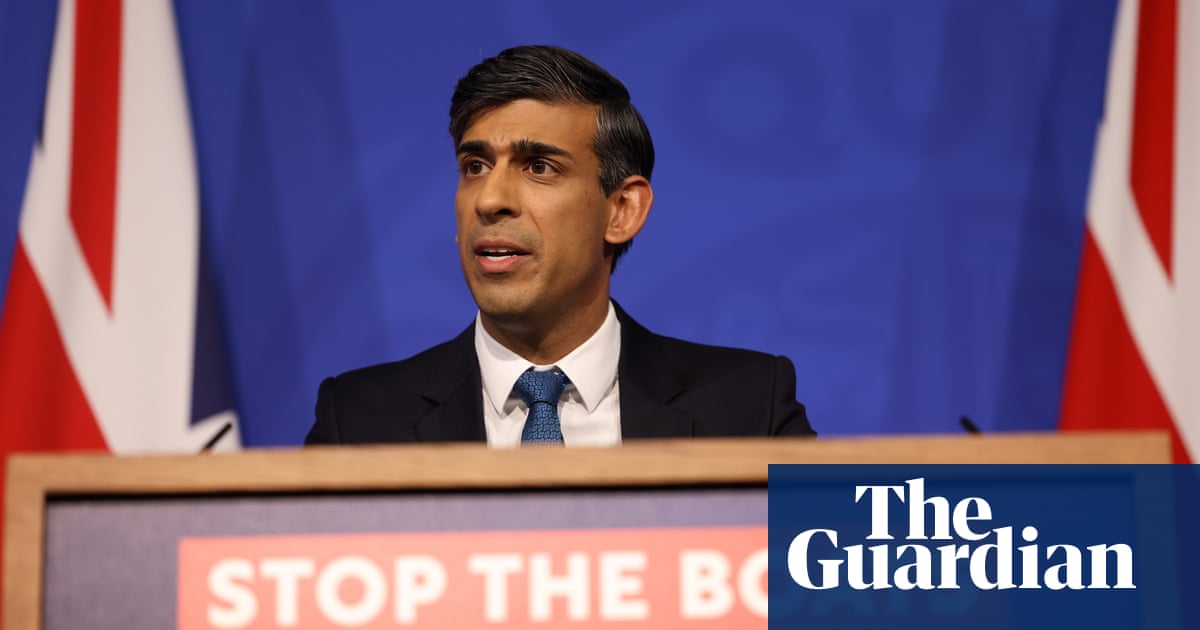
The government under Rishi Sunak plans to introduce a complete legislation to parliament that would overturn the supreme court’s ruling against sending asylum seekers to Rwanda. This move is likely to face opposition from members of parliament and the House of Lords, casting uncertainty on the timeline for asylum seeker flights to commence in the spring.
According to Downing Street, the law will be released in two weeks, following the autumn statement next week. It will be considered primary legislation and must go through the standard processes in both the House of Commons and the House of Lords.
The spokesperson for Sunak stated that they are eager to complete the task as soon as possible. However, the timeline will be influenced by other parties and the Commons speaker, Lindsay Hoyle. They also mentioned that they will be communicating with all members of the house regarding this matter.
During a press conference on Wednesday, Sunak revealed the concept after the supreme court’s decision was made against the plan. He stated that emergency legislation would be put in place to declare Rwanda as a secure destination for asylum seekers to be transported to by plane. He also mentioned that flights could potentially commence in the spring, but did not make any promises.
Although laws have been rapidly passed in a single day before, there is no exception for emergency legislation and it can only occur with bipartisan agreement, which appears improbable in this scenario.
According to his spokesperson, Sunak will encourage members of Parliament and peers to support the law as it aligns with the desires of voters. They believe their actions are in line with the will of the public and trust that parliament will also honor that, while still being able to analyze the specifics.
When asked about the evidence the government could provide to demonstrate that the public desired the flights to depart, he stated: “I believe that fulfilling the Rwanda migration partnership remains a priority for the public.”
The decision made by the court was a major setback for the Rwanda strategy, which is a key part of Sunak’s promise to prevent unauthorized asylum seekers from entering the UK via small boats across the Channel. The goal is to discourage individuals from attempting the crossing by imposing deportation and eliminating the possibility of returning to the UK.
According to the five judges, there is proof that asylum seekers could be at risk of “refoulement,” which means being returned to their home countries where they may face harm, even if they have a valid reason for seeking asylum.
Sunak has additionally declared a proposal to implement a comprehensive agreement with Rwanda regarding their handling of incoming individuals. The release of this agreement could potentially occur as soon as the upcoming week. However, this is not a swift procedure, as there is a required wait time of at least 21 sessions in the House of Commons before treaties can be officially approved.
According to Sunak’s representative, the government believes that using both legislation and the treaty is the most efficient way to resume flights by preventing legal challenges.
The legislation is thought by Downing Street to put an end to “systemic” challenges like judicial reviews, but it is still uncertain if people facing deportation would be able to initiate legal proceedings.
The spokesperson for Sunak stated that they were confident that the concerns raised by the supreme court about the safety of asylum seekers in Rwanda could be addressed by No 10. They have been working closely with Rwanda in the past few months to improve the quality of asylum decision making and to ensure stronger judicial oversight of the process.
“We think that the substantive work we have done in preparation for the possibility of this outcome will address the concerns the court raised – obviously the court was looking at a situation from 15 months ago.”
Sunak still has a big political challenge ahead as he deals with demands from the more conservative members of the Conservative party to begin deportations. Despite this, the prime minister’s indirect threats that the UK could leave the institution if the European court of human rights gets involved have caused concern among some moderate Tory MPs.
The government’s spokesperson for Sunak stated that if courts from other countries take action, it may lead the government to reconsider their international relationships, not only with the Strasbourg court but also with the UN refugee convention. However, no additional information was provided.
Source: theguardian.com


